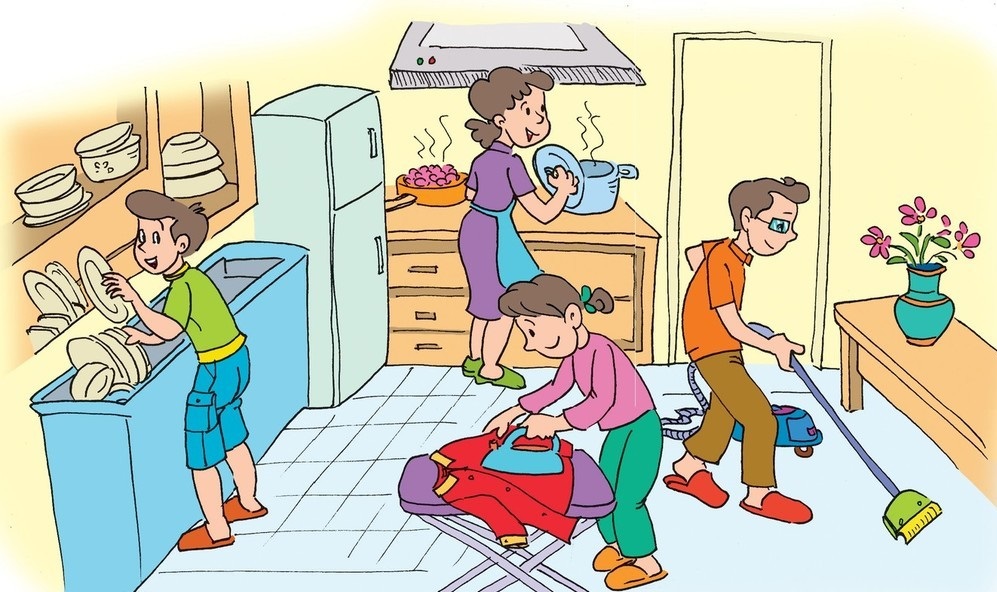Bài học cùng chủ đề
Báo cáo học liệu
Mua học liệu
Mua học liệu:
-
Số dư ví của bạn: 0 coin - 0 Xu
-
Nếu mua học liệu này bạn sẽ bị trừ: 2 coin\Xu
Để nhận Coin\Xu, bạn có thể:

Luyện tập SVIP
 Wish you a happy day!
Wish you a happy day!
Lesson objectives
In this lesson, we're getting to know
* the topic "Family life"
* the vocabulary about household chores and duties in the family
* the grammar point: The present simple and the present continuous.
Listen and read

|
Nam: Hello? Mr Long: Hello, Nam? This is Uncle Long. Is your dad there? I'd like to ask him out for a game of tennis. Nam: Well, I'm afraid he can't go out with you now. He's preparing dinner. Mr Long: Is he? Where's your mum? Doesn't she cook? Nam: Oh, yes. My mum usually does the cooking, but she's working late today. Mr Long: How about your sister and you? Do you help with the housework? Nam: Yes, we do. In my family, everybody shares the household duties. Today my sister can't help with the cooking. She's studying for exams. |
Mr Long: I see. So how do you divide household chores in your family? Nam: Well, both my parents work, so we split the chores equally - my mother cooks and shops for groceries, my father cleans the house and does the heavy lifting, my sister does all the laundry, and I do the washing-up and take out the rubbish. Mr Long: Really? It's different in my family. My wife handles most of the chores around the house and I'm responsible for the household finances. She's the homemaker and I'm the breadwinner. Anyway, I have to go now. Tell your dad I called. Bye. Nam: Oh yes, I will. Bye, Uncle Long. |

|
Nam: Hello? Mr Long: Hello, Nam? This is Uncle Long. Is your dad there? I'd like to ask him out for a game of tennis. Nam: Well, I'm afraid he can't go out with you now. He's preparing dinner. Mr Long: Is he? Where's your mum? Doesn't she cook? Nam: Oh, yes. My mum usually does the cooking, but she's working late today. Mr Long: How about your sister and you? Do you help with the housework? Nam: Yes, we do. In my family, everybody shares the household duties. Today my sister can't help with the cooking. She's studying for exams. |
Mr Long: I see. So how do you divide household chores in your family? Nam: Well, both my parents work, so we split the chores equally - my mother cooks and shops for groceries, my father cleans the house and does the heavy lifting, my sister does all the laundry, and I do the washing-up and take out the rubbish. Mr Long: Really? It's different in my family. My wife handles most of the chores around the house and I'm responsible for the household finances. She's the homemaker and I'm the breadwinner. Anyway, I have to go now. Tell your dad I called. Bye. Nam: Oh yes, I will. Bye, Uncle Long. |
Read the conversation again. Then decide whether the following statements are true (T), false (F), or not given (NG).
1. Nam's father is going out to play tennis with Mr Long.
2. Nam's mother is a busy woman.
3. Nam's sister is cooking dinner.
4. Sometimes Nam's father cooks.
5. Everybody in Nam's family does some of the housework.
6. Mr Long never does any household chores.
 Listen and repeat the words and phrases.
Listen and repeat the words and phrases.
|
rubbish washing-up laundry |
household finances groceries |
household chores heavy lifting |

![]()
|
Nam: Hello? Mr. Long: Hello, Nam? This is Uncle Long. Is your dad there? I'd like to ask him out for a game of tennis. Nam: Well, I'm afraid he can't go out with you now. He's preparing dinner. Mr. Long: Is he? Where's your mum? Doesn't she cook? Nam: Oh, yes. My mum usually does the cooking, but she's working late today. Mr. Long: How about your sister and you? Do you help with the housework? Nam: Yes, we do. In my family, everybody shares the household duties. Today my sister can't help with the cooking. She's studying for exams. |
Mr. Long: I see. So how do you divide household chores among your family? Nam: Well, both my parents work, so we split the chores equally - my mother cooks and shops for groceries, my father cleans the house and does the heavy lifting, my sister does all the laundry, and I do the washing-up and take out the rubbish. Mr. Long: Really? It's different in my family. My wife handles most of the chores around the house and I'm responsible for the household finances. She's the homemaker and I'm the breadwinner. Anyway, I have to go now. Tell your dad I called. Bye. Nam: Oh yes, I will. Bye, Uncle Long. |
Read the conversation again. Then write the verbs or verbs phrases that are used with the following words or phrases.
| Verbs/Verb phrases | Words/Phrases | |
| 1 | split, divide, | (household) chores |
| 2 | the rubbish | |
| 3 | the laundry | |
| 4 | groceries | |
| 5 | do | the heavy lifting |
| 6 | do | the washing-up |
| 7 | household finances |
(Kéo thả hoặc click vào để điền)
Vocabulary
1. chore (n) (việc vặt hàng ngày) a task that you do regularly
household chores (n) việc vặt hàng ngày trong gia đình
Eg 1: Both my parents work, so we split the chores equally.
(Cả bố và mẹ tôi làm việc, vì vậy chúng tôi phân chia công việc vặt hàng ngày đều nhau.)
Eg 2: The children were each assigned different household chores.
(Những đứa trẻ được phân chia một công việc nhà khác nhau.)
2. do the heavy lifting (n) (làm công việc nặng nhọc) do the hard or difficult work
Eg 1: My mother cooks and shops for groceries, my father cleans the house and does the heavy lifting.
(Mẹ tôi nấu ăn và mua đồ khô, bố tôi lau nhà và làm những việc nặng nhọc.)
Eg 2: People do the heavy lifting for the things that make the program function as a program.
3. do the laundry (n) (giặt giũ) wash clothes, sheets, etc. that need washing, that are being washed, or that have been washed recently.
Eg 1: My sister does all the laundry.
(Chị tôi giặt quần áo.)
Eg 2: I have to do the laundry every day.
(Tôi phải giặt quần áo mỗi ngày.)
4. do the washing-up (n) (rửa bát đĩa (sau khi ăn)) wash plates, glasses, pans, etc. after a meal.
Eg: If you cook, I'll do the washing-up.
(Nếu bạn nấu ăn, tôi sẽ rửa bát.)
5. take out the rubbish: (đổ rác) put the rubbish into the rubbish bin.
Eg 1: I take out the rubbish. (Tôi đổ rác.)
Eg 2: It's Wednesday so remember to take out the rubbish.
(Hôm nay là thứ Tư vì vậy, hãy nhớ đổ rác nhé.)
6. responsible (for/to something) (adj) (chịu trách nhiệm về cái gì) having the job or duty of doing something or taking care of somebody/something, so that you may be blamed if something goes wrong.
Eg 1: I am responsible for the household finances.
(Tôi chịu trách nhiệm về tài chính gia đình.)
Eg 2: Mike is responsible for designing the entire project.
(Mike chịu trách nhiệm về thiết kế toàn bộ dự án.)
7. homemaker (n) (người nội trợ) a person who works at home and takes care of the house and family.
Eg 1: She's the homemaker.
(Cô ấy là một người nội trợ.)
Eg 2: For years she was a homemaker raising three children.
(Đã rất nhiều năm cô ấy là một người nội trợ nuôi ba đứa trẻ.)
8. breadwinner (n) (người trụ cột( trong gia đình)) a person who supports his family with the money he earns.
Eg: When the baby was born, I became the breadwinner.
(Khi đứa bé được sinh ra, tôi trở thành người trụ cột trong gia đình.)
![]() Choose the correct option to complete the sentence.
Choose the correct option to complete the sentence.
1. Being the breadwinner of the family,
2. Being the homemaker of the family,

Bạn có thể đăng câu hỏi về bài học này ở đây
